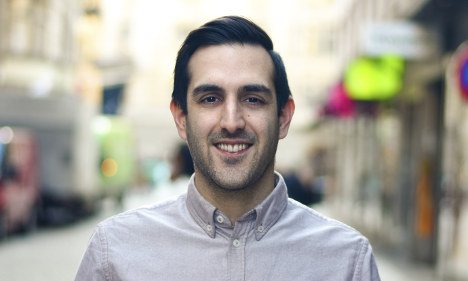Jason Dainter, 31, Head of Brand Relations for Universal Avenue and manager of startup event Uppstart, Uppsala

Jason Dainter. Photo: Private
My background is as a technology entrepreneur building startups, and I'm pretty against the EU exit because I believe the EU helps entrepreneurs to move between and work freely in different countries. I believe Brexit would be closing the door on an extremely healthy eco-system, especially in the startup and technology space.
Traditionally, the US has dominated the world with the highest number of unicorn companies (those valued at over one billion dollars) and Europe has struggled to compete. One reason, it is argued, is that geographical, cultural, political and language barriers between European countries are much higher than across US states. If the UK leaves the EU, it simply adds yet more friction, which in my view would be a disaster. With Sweden being the second hub (per capita) only to San Fransisco at producing billion dollar unicorns, this is a time when we should be building bridges between European countries, not knocking them down.
I moved to Sweden six years ago, to live with my girlfriend in Uppsala. I've got a permanent 'right to reside' here and I am now in the process of applying for a dual citizenship.
Claire Duffy, 37, writer, Stockholm

Claire Duffy kayaking in Stockholm. Photo: Private
The UK should watch out for me if I am forced to move home because of a Brexit. Make no mistake, I would be in a very bad mood.
I moved to Sweden for no particular reason — I wondered what a life in Stockholm might be like and I was able to try it out because I am an EU citizen. Five years later, I am still here. I have been working in the creative industries and running my own business, doing projects which have benefited Swedish companies. I even own a property here. I have also benefited from the health and welfare rights I get as a result of the UK being in the EU. For example when I had a skiing accident I didn’t have to think twice about the costs of healthcare because I knew I would be protected.
I feel that most of the arguments about Brexit have been about migration to the UK rather than how it might affect Brits who are EU migrants in other countries. I do think that the EU needs to be reformed but the UK should definitely stay in it.

Chelsea Foreman moved to Gothenburg with her family and now lives in Karlstad. Photo: Private
Delina Östborn, 40, former lawyer and mother, Stockholm
At the moment I am leaning towards voting to leave the EU and that comes with its own set of worries. The main one is that we are being asked to decide between sticking with what we know, or leaving, even though no-one can say at this point under which circumstances we would exit the union.
I am concerned about how ‘Little England’ might cope out on its own if there is a Brexit. I want the politicians to tell us more about how we would try and make things work if we left, and the kind of UK we are aiming to be part of if we are no longer in EU.
A big problem at the moment is that if you say you want the UK to leave the EU, you get clubbed together with the anti-immigration Eurosceptic crew like Ukip leader Nigel Farage, who have hijacked the debate. I actually have very different arguments about why the UK should break away. Historically, I think that being part of the union has been very beneficial to the UK. I just think the EU has got very big and I don't see how it can work going forward. There are so many countries all with different agendas and cultures and the EU seems unable to deal with one problem before the next one arises.
Craig Mitchell, 33, Phd student and entrepreneurship lecturer, Lund
Craig Mitchell. Photo: PrivateI
I'm genuinely torn about which way to vote. I moved to Sweden from central Scotland ten years ago to do my bachelor's degree, ended up staying to do my masters and now I am studying for a PhD as well as teaching entrepreurship. If I think of the many British students I have taught, being in the EU is great, since EU students don't have to pay tuition fees here. The quality of education is high and there are huge financial benefits. So, on paper, I am very pro-Europe.
However, I am also a strong supporter of Scottish independence, which makes things complicated. If the UK votes for a Brexit, to leave the EU, a side effect could be a re-run of the recent independence referendum in Scotland, because support for the EU is much higher in Scotland than in the rest of Britain.
So if I vote for the UK to stay in Europe, then I could actually be preventing another opportunity for Scots to vote to break away, which is my ultimate goal. I think there may be an element of tactical voting in Scotland for this very reason.
Kristian Hell, 36, founder of Sideline City run club and events organizer, Stockholm

Kristian Hell at a running event hosted by Trädgården night club, Stockholm. Photo: Private
I'm from Australia but I was able to get a British passport because my father was born in Britain. I would like the UK to stay in, because it benefits me as an Australian who wants to stay in Sweden. I do quite a bit of travelling and it's so smooth to have a UK passport — is it going to stay like that? If the UK left I would begin the process of applying for a Swedish passport.
Many Australians do what I did and go to London first of all when they come to Europe, just because that's where the direct flights go. I wonder what would happen between the UK and Australia if they left the EU, but we'll just have to wait and see.
I see the UK as a real power and I would wonder what was going on in the world if it pulled out, but I think it is going to affect Brits in Britain much more than those elsewhere. People living in the EU are going to figure it out. Like most things the dust settles and goes back to normal, that's just what the world is like.
Dr Hang Kei Ho, 34, Postdoctoral Fellow at the Department of Social and Economic Geography, Uppsala University, Uppsala

Dr Hang Kei Ho. Photo: Private
I am a British citizen originally from Hong Kong. Being an academic, I usually like to present both sides of the argument. I could argue that it is crucial for Britain to stay in the EU to attract highly skilled researchers and colleagues from other member states. In contrast, Eurosceptics believe that the free movement of labour has also attracted a number of low skilled workers coming to Britain and competing with the British workforce, affecting wages and the standard of living. But as an academic myself you can probably guess which side I am going to vote for.
In the case that Brexit takes place, Britain could go through years of political and economic disruption because of the renegotiation of regulations with Europe as well as other parts of the world. Brexit wouldn't have a direct impact on me, and both Brits and Swedes would still be able to trade and move around quite freely through drawing new agreements between the two countries. Nevertheless, I think this is the perfect moment for British citizens to have an open dialogue on who they want to become on both a national and a global level.
Interviews: Emma Löfgren and Maddy Savage



 Please whitelist us to continue reading.
Please whitelist us to continue reading.